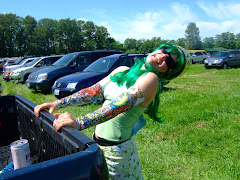 chic readings, Catholic symbolism (long story, but the dish of Saint Christopher medals in episode 202, Driver Ed, was my idea), STDs, and a bunch of other stuff that sometimes turned out to be useful, but mostly not.
chic readings, Catholic symbolism (long story, but the dish of Saint Christopher medals in episode 202, Driver Ed, was my idea), STDs, and a bunch of other stuff that sometimes turned out to be useful, but mostly not.One thing that would’ve helped me help Veronica is Sam Gosling’s book, Snoop: What Your Stuff Says About You, but it wasn’t published until 2008, and by that time, I was back here, helping high school kids learn important skills such as including a “Table of Contents” at the beginning of their papers instead of a “Table of Context.”[1]
In Snoop Gosling delves into the science behind the messages that our stuff—and the things of others—says about who we are. How does the arrangement of our books reveal our
 personalities? What do we give away about our innermost selves in the geegaws and knickknackery displayed in our homes, offices, classrooms, and cars? How can we “read” others by looking at their surroundings? What does it mean that I have a set of South Park finger puppets and a unicorn-on-a-stick in my office at school?
personalities? What do we give away about our innermost selves in the geegaws and knickknackery displayed in our homes, offices, classrooms, and cars? How can we “read” others by looking at their surroundings? What does it mean that I have a set of South Park finger puppets and a unicorn-on-a-stick in my office at school?Surprisingly, the messages you intend to send when you arrange your tchotchkes aren’t always the ones your observers pick up on, and you can’t always trust what you see when you make guesses about others’ lives based on their stuff. But you can learn some useful tools for understanding people and their personalities, and Gosling’s research and entertaining presentation shows you how.
But his book isn’t just (or really) about snooping on a subversive level. If you want to rummage through your acquaintances’ bedside tables and bathroom cabinets, be my guest, but there are some easier and more valuable things you can learn just by looking and listening to the indicators they display right out in public. And I’m not talking about the friends who have the Vietnamese Love Swing[2] in their rec room or whatever.
Everyday, ordinary, preferences tell us more about people than do the things they hide. Studies have shown, for example, that “music consistently trumps books, clothing, food, movies, and television shows in helping people get to know each other.” Keep that in mind when you’re snooping: you can learn more from the CD collection than the bookshelf.
[1] Honest to God, someone really wrote that.
[2]Just for the record, I have no idea what a Vietnamese Love Swing is, nor do I know anyone who has one. I don’t think.







 Snowbound for days, you would reasonably assume that I did nothing but read pile after pile of books, gleefully thankful that my mini-van was undriveable, work unaccessible, and the outside world an unreachable, distant memory. Not so much.
Snowbound for days, you would reasonably assume that I did nothing but read pile after pile of books, gleefully thankful that my mini-van was undriveable, work unaccessible, and the outside world an unreachable, distant memory. Not so much.



